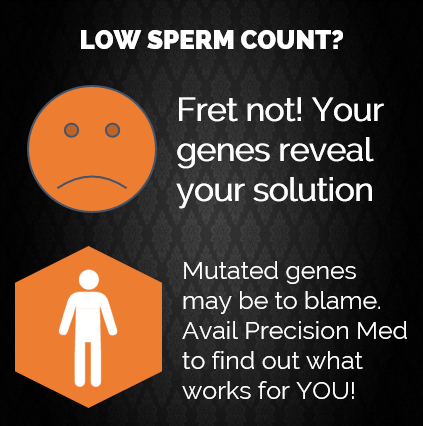Guiding therapy to make you a father: Y Chromosome Microdeletions test
If your sperm count is between 0-5 million per ml (Azoospermia or Severe Oligozoospermia), this test is recommended by all Professional Organizations:
-
American Society for Reproductive Medicine
-
European Academy of Andrology
-
European Association of Urology
-
American Urological Association
Find out if you need a procedure like biopsy to get good sperms, or resort to simpler ways to enhance your sperm count!
The report guides you on the requirement of testicular surgeries – varicocelectomy (surgery for correction of engorged veins), which is unsuccessful in 80% of men, or testicular biopsy for sperm extraction. For the vast majority of men, much less invasive methods such as hormonal therapy may enhance their sperm parameters.
FAQ
What is varicocelectomy and will I benefit from it?
Varicoceles are enlarged varicose veins that occur in the scrotum. 40 out of 100 men with infertility may be affected by this. Varicocelectomy is the surgical repair of these enlarged veins. Men with YCMD are not likely to benefit from this procedure.
What is TESE and will I benefit from it?
Testicular Sperm Extraction (TESE) is the procedure done to retrieve sperms from the testes of men with low sperm count in the ejaculate. Men with AZFc deletion may benefit from TESE with micro-TESE offering higher benefits. Men with AZFa or AZFb deletions are unlikely to benefit from this procedure.
Will my family be affected?
In case mutations are reported, there are high chances of male family members being affected as well. It is recommended to test infertile men in the family.
Will I pass the mutation on to my children?
The Y chromosome is present in only men. If the mutation is present, it will be passed on to male children. As the Y chromosome is absent in females, they will not be affected.
Science
Genes/Regions tested: SRY, AZFa, AZFb, AZFc (reflex testing for AMELxy and Yq heterochromatin)
The Y chromosome is particularly susceptible to microdeletions that cannot be detected by cytogenetics (karyotyping), but require specialized molecular tests such as this panel. Identifying the particular region of deletion will help in both predicting response to certain therapies as well as advise therapies and further steps to fatherhood based on the results.
References
European Association of Urology 2014, Guidelines on male infertility
American Society for Reproductive Medicine 2012, (Committee opinion in) Fertility and Sterility 98
American Urological Association 2011, The optimal evaluation of the infertile male: best practice statement
